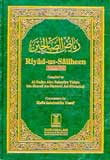Riyad Us-Saliheen (Gardens of the Righteous)

Chapter 169
Helping a Companion
969. Abu Sa`id Al-Khudri (May Allah be pleased with him) reported: While we were travelling with the Messenger of Allah (PBUH), a rider came and began to stare on the right and on the left. The Messenger of Allah (PBUH) said, "He who has an extra mount should hand it over to one who has none, and he who possesses surplus provision, should give it to him who is without provision.'' He named various kinds of possessions until we began to think (realize) that none of us had any right to anything surplus.
[Muslim].
Commentary: Nowadays, there is a great fanfare of money-lending institutions such as cooperative societies, the financing companies and insurance companies which are apparently helpful in resolving the financial crises of people. But all are rooted in interest system which is rejected outright by Islam for its exploitative nature. These so-called cooperative institutions are indeed like blood-sucking leeches which ruin man. Islam, on the contrary, has given us a positive, simple and man-orientated formula of mutual cooperation. It teaches us that what can be spared should be given to those who need it. This obviates the chances of hoarding as well as the concentration of wealth in a few hands. No doubt, it is a moral instruction. But if Muslims, called as a single body, develop a true sense and awareness of it, wonderful results can accrue from it on a large social scale. What is more, the sublimity of man's Faith and moral behaviour stands on it. One who is indifferent to the perfection of Faith and morality may set it aside. But a man who rates Faith above everything can hardly afford to avoid putting this moral advice into practice.
970. Jabir (May Allah be pleased with him) reported: When the Messenger of Allah (PBUH) made up his mind to go in an expedition, he would say to us, "O Muhajirin and the Ansar! There are among you such people who have no property and no kinsfolk. Let everyone of you take along with him two or three men. None of us had a spare animal we took rides by turn.'' So I took two or three men with me and I rode my camel by turn equally with them.
[Abu Dawud].
Commentary: Firstly, this Hadith describes the Companions' condition in the early phase of Islam. Everybody participating in Jihad did not have an animal and so was the condition in respect of weapons and food. But in spite of all that, the Companions' zeal for Jihad was great. Secondly, it presents the picture of mutual cooperation which the Companions extended to one another. From all these considerations, emerges their distinctive place in history.
971. Jabir (May Allah be pleased with him) reported: The Messenger of Allah (PBUH) used to lag behind while travelling and urge the weak to walk quickly. He used to take up someone behind him and make supplication for him.
[Abu Dawud].
Commentary: This Hadith tells us that the leader of a group (or Amir) should, during a journey, remain in the rear instead of the vanguard so that he may prop up the weak people and provide succour to the resourceless ones. Furthermore, he is presumed to pray for such people as the blessing of his prayer is likely to make up their deficiencies.
